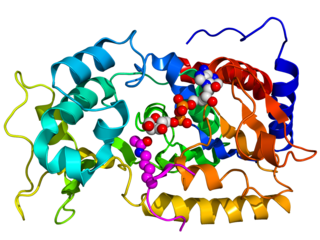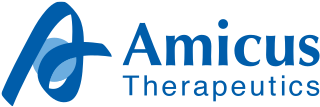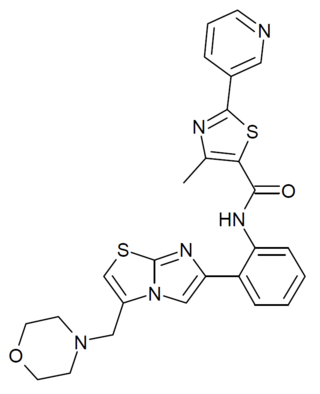Related Research Articles

GSK plc is a British multinational pharmaceutical and biotechnology company with global headquarters in London. It was established in 2000 by a merger of Glaxo Wellcome and SmithKline Beecham, which was itself a merger of a number of pharmaceutical companies around the Smith, Kline & French firm.

Resveratrol (3,5,4′-trihydroxy-trans-stilbene) is a stilbenoid, a type of natural phenol or polyphenol and a phytoalexin produced by several plants in response to injury or when the plant is under attack by pathogens, such as bacteria or fungi. Sources of resveratrol in food include the skin of grapes, blueberries, raspberries, mulberries, and peanuts.

Rosiglitazone is an antidiabetic drug in the thiazolidinedione class. It works as an insulin sensitizer, by binding to the PPAR in fat cells and making the cells more responsive to insulin. It is marketed by the pharmaceutical company GlaxoSmithKline (GSK) as a stand-alone drug or for use in combination with metformin or with glimepiride. First released in 1999, annual sales peaked at approximately $2.5-billion in 2006; however, following a meta-analysis in 2007 that linked the drug's use to an increased risk of heart attack, sales plummeted to just $9.5-million in 2012. The drug's patent expired in 2012.

Sirtuins are a family of signaling proteins involved in metabolic regulation. They are ancient in animal evolution and appear to possess a highly conserved structure throughout all kingdoms of life. Chemically, sirtuins are a class of proteins that possess either mono-ADP-ribosyltransferase or deacylase activity, including deacetylase, desuccinylase, demalonylase, demyristoylase and depalmitoylase activity. The name Sir2 comes from the yeast gene 'silent mating-type information regulation 2', the gene responsible for cellular regulation in yeast.
Leonard Pershing Guarente is an American biologist best known for his research on life span extension in the budding yeast Saccharomyces cerevisiae, roundworms, and mice. He is a Novartis Professor of Biology at the Massachusetts Institute of Technology.

David Andrew Sinclair is an Australian-American biologist and academic known for his research and controversial claims on aging and epigenetics. Sinclair is a professor of genetics at Harvard Medical School.

Sirtuin 1, also known as NAD-dependent deacetylase sirtuin-1, is a protein that in humans is encoded by the SIRT1 gene.

SRT-1720 is an experimental drug that was studied by Sirtris Pharmaceuticals intended as a small-molecule activator of the sirtuin subtype SIRT1. The compound has been studied in animals, but safety and efficacy in humans have not been established.
Sirtuin-activating compounds (STAC) are chemical compounds having an effect on sirtuins, a group of enzymes that use NAD+ to remove acetyl groups from proteins. They are caloric restriction mimetic compounds that may be helpful in treating various aging-related diseases.
Christoph Westphal is an American biomedical businessman.
Michelle Dipp is an American scientist, businesswoman, and investor. She is the co-founder and a managing partner at Biospring Partners and serves on the board of Abzena and Kiniciti.

SRT-2183 is a drug in development by Sirtris Pharmaceuticals intended as a small-molecule activator of the sirtuin subtype SIRT1. It has similar activity in animal studies to another SIRT1 activator SRT-1720, but is closer in potency to resveratrol. In animal studies it was found to improve insulin sensitivity and lower plasma glucose levels in fat, muscle and liver tissue, and increased mitochondrial and metabolic function. However, the claim that SRT-2183 is a SIRT1 activator has been questioned and further defended.

SRT-1460 is a drug in development by Sirtris Pharmaceuticals intended as a small-molecule activator of the sirtuin subtype SIRT1. It has similar activity in animal studies to the known SIRT1 activator resveratrol, but is closer in potency to SRT-1720. In animal studies it was found to improve insulin sensitivity and lower plasma glucose levels in fat, muscle and liver tissue, and increased mitochondrial and metabolic function. However, the claim that SRT1460 is a SIRT1 activator has been questioned and further defended.

Amicus Therapeutics, Inc. is a public American biopharmaceutical company based in Philadelphia, PA. The company went public in 2007 under the NASDAQ trading symbol FOLD. This followed a 2006 planned offering and subsequent withdrawal, which would have established the trading symbol as AMTX Prior to their IPO, Amicus was funded by a variety of venture capital firms including Radius Ventures, Canaan Partners and New Enterprise Associates.
OvaScience was a publicly traded biotechnology company, focused on female infertility. It was founded in 2011 by Michelle Dipp, Richard Aldrich, Christoph Westphal, Jonathan Tilly, and David Sinclair and is based on scientific work done by Tilly concerning mammalian oogonial stem cells and work on mitochondria by Sinclair. Tilly's work was expectedly met with skepticism, as it warranted a paradigm-shift; however, many labs across the world have been able to reproduce his results over several decades.
Verastem, Inc., doing business as Verastem Oncology, is an American pharmaceutical company that develops medicines to treat certain cancers. Headquartered and founded in Boston, Massachusetts, the firm is a member of NASDAQ Biotechnology Index.

SRT-2104 is an experimental drug that was studied by Sirtris Pharmaceuticals as a small-molecule activator of the sirtuin subtype SIRT1. The compound progressed to Phase II human trials for Type II diabetes before development was discontinued, however it continues to be widely used in animal research into the functions of SIRT1.

SRT-3025 is an experimental drug that was studied by Sirtris Pharmaceuticals as a small-molecule activator of the sirtuin subtype SIRT1. It has been investigated as a potential treatment for osteoporosis, and anemia.

STAC-9 is an experimental drug that was developed by GlaxoSmithKline as a small-molecule activator of the sirtuin subtype SIRT1, with potential applications in the treatment of diabetes.

Peter Elliott is a British pharmacologist and drug developer who has initiated clinical trials across a range of disease areas, and is the co-developer of Velcade, a drug used to treat multiple myeloma.
References
- 1 2 3 4 Couzin, J (27 February 2004). "Scientific community. Aging research's family feud". Science. 303 (5662): 1276–9. doi:10.1126/science.303.5662.1276. PMID 14988530. S2CID 161459205.
- ↑ "Sirtris S-1 Registration for IPO". Sirtris via SEC Edgar. March 1, 2007.
- ↑ Wade, Nicholas (17 August 2009). "Tests Begin on Drugs That May Slow Aging". The New York Times.
- 1 2 McBride, Ryan (12 August 2010). "Former Sirtris Execs' Nonprofit Starts Selling Resveratrol with Potential Anti-Aging Effects Online". Xconomy.
- 1 2 Carroll, John; McBride, Ryan (Mar 12, 2013). "UPDATED: GSK moves to shutter Sirtris' Cambridge office, integrate R&D". FierceBiotech.
- ↑ Herper, Matthew (24 April 2008). "Why Glaxo Bought Sirtris". Forbes. Archived from the original on October 5, 2008.
- ↑ Lowe, Derek (12 January 2010). "The Sirtris Compounds: Worthless? Really?". In the Pipeline.
- ↑ Herper, Matthew (26 January 2010). "Doubts Build On Glaxo's Antiaging Drugs". Forbes.
- ↑ Fitzpatrick Dimond, Patricia F. (February 16, 2010). "Sirtuins: Antiaging Medicines or Marketing?". Genetic Engineering & Biotechnology News.
- ↑ Schmidt, C (March 2010). "GSK/Sirtris compounds dogged by assay artifacts". Nature Biotechnology. 28 (3): 185–6. doi:10.1038/nbt0310-185. PMID 20212464. S2CID 1162439.
- ↑ Beher, Dirk; Wu, John; Cumine, Suzanne; Kim, Ki Won; Lu, Shu-Chen; Atangan, Larissa; Wang, Minghan (2009). "Resveratrol is Not a Direct Activator of SIRT1 Enzyme Activity". Chemical Biology & Drug Design. 74 (6): 619–24. doi:10.1111/j.1747-0285.2009.00901.x. PMID 19843076. S2CID 205913187.
- ↑ Pacholec, M.; et al. (2010). "SRT1720, SRT2183, SRT1460, and Resveratrol Are Not Direct Activators of SIRT1". Journal of Biological Chemistry. 285 (11): 8340–51. doi: 10.1074/jbc.M109.088682 . PMC 2832984 . PMID 20061378.
- ↑ Singer, Natasha (August 13, 2010). "Glaxo Censures Sale of Supplements". New York Times.
- ↑ Feuerstein, Adam (12 August 2010). "Glaxo Slaps Former Sirtris Execs". TheStreet.
- 1 2 3 Wade, Nicholas (10 January 2011). "Doubt on Anti-Aging Molecule as Resveratrol Trial Is Halted". The New York Times.
- 1 2 3 "GlaxoSmithKline Halts All Further Development Of Resveratrol Drug SRT501". Myeloma Beacon. November 30, 2010.
- ↑ "GSK absorbs controversial 'longevity' company : News blog". Nature Blog.
- 1 2 Timmerman, Luke (12 March 2013). "GlaxoSmithKline Shuts Down Sirtris, Five Years After $720M Buyout". Xconomy.
- ↑ "SRT 2104". AdisInsight. Retrieved 13 February 2017.